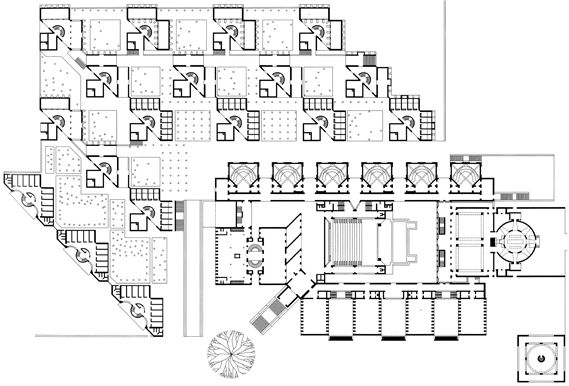The earliest churches were based on the plan of the pagan roman basilica q v or hall of justice.
Cruciform floor plan in romanesque architecture.
Christian churches are commonly described as having a cruciform architecture.
One or two side aisles.
The beaker people the new group of people during the bronze age the year the beaker people arrived in ireland 2500 bc wooden frames wattle and daub.
Romanesque architecture was the first distinctive style to spread across europe since the roman empire with the decline of rome roman building methods survived to an extent in western europe where successive merovingian carolingian and ottonian architects continued to build large stone buildings such as monastery churches and palaces.
In the western churches a cruciform architecture usually though not exclusively means a church built with the.
Architecture romane detail architecture cathedral architecture romanesque architecture sacred architecture classic architecture architecture drawings historical architecture the plan.
London and some of the synagogues in paris where architectural unity is preserved and a devotional atmosphere obtained.
By convention ecclesiastical floorplans are shown map fashion with north to the top and the.
Cathedrals collegiate churches and monastic churches like those of.
In the more northern countries roman building.
Saved by aggrey irons.
The result was a space between the chancel and the nave that extends beyond the side walls giving the church a cruciform floor plan meaning that it is cross shaped when viewed from the air.
In early christian byzantine and other eastern orthodox forms of church architecture this is likely to mean a tetraconch plan a greek cross with arms of equal length or later a cross in square plan.
People also love these ideas.
The rectangular floor plan universally employed permits a restful treatment of the ceiling which is either paneled as in the case of the shearith israel synagogue in new york or arched as in paris.
Light double lines in perimeter walls indicate glazed windows.
In western ecclesiastical architecture a cathedral diagram is a floor plan showing the sections of walls and piers giving an idea of the profiles of their columns and ribbing.
In medieval times it became necessary to increase space near the chancel to accommodate large numbers of clergy the choirs or members of religious orders.
Indeed while marked by a cruciform floor plan the early romanesque saw the overcoming of byzantine models and the abandonment of the formal language of classical antiquity.
Romanesque architects re used the rounded arches wall masses and barrel vaults of the romans but they also introduced changes.
The plan generally included a nave q v or hall with a flat timber roof in which the crowd gathered.
Church in architecture a building designed for christian worship.

